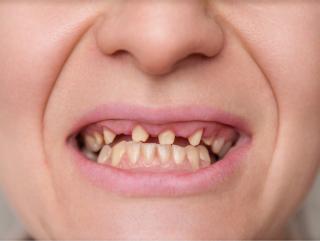
Dental Implants
The best treatment for replacing a single or multiple teeth.
Are you tired of hiding your smile due to missing teeth? Broken, missing, or otherwise damaged teeth negatively impact your life in a variety of ways. Importantly, damaged or missing teeth can also negatively impact your oral health.
Dental implants can help improve your teeth, so you smile more and maintain your oral health.
What are dental implants?
Dental implants are permanent replacements that look, feel, and function like natural teeth, making them a popular choice among individuals seeking permanent tooth replacement solutions and a natural-looking smile.
Whether it’s to replace a single tooth or to create a full mouth of secure, stable new teeth, implants are a proven long-lasting alternative to bridges and dentures.


Types of Dental Implants
There are three common types of dental implants that are available, all of which are dependent on your individual needs and the existing health of your remaining teeth and gums.

Single Crowns
A customised crown blends in with your smile for a single tooth replacement.
Implant Bridges
A pair (or more) of implants supports a multi-tooth restoration bridge in order to support an implant for each individual missing tooth.
All-on-4
Replace all of your upper or lower teeth with one streamlined prosthesis.
What to expect during Dental Implant treatment?
Dental implants involve several steps to ensure a successful outcome meaning you will require multiple visits to your dentist. In the event of infections, tooth decay, or gum disease, you'll need treatment before tooth implant surgery can proceed.
Step 1. Comfortable Implant Placement
Your dentist will use scans and X-rays to determine the precise placement of the implant in your jawbone. The implant will then be fitted into your jawbone in a minor operation. Usually, this will be carried out under anaesthetic, so you won’t feel any pain during the procedure.
Step 2: Healing and Integration
Over the following months, the implant will fuse with the surrounding bone, providing a stable foundation. Once this integration is complete, a crown will be designed and manufactured so it matches your natural teeth in shape, size, and colour.
Step 3: Final Restoration
Finally, the artificial tooth will be attached to the implant, resulting in a fully functional and aesthetically pleasing replacement tooth.
Why and How to Replace Missing Teeth
How Many Teeth Can I Replace?
We’ll work with you to determine the total number of implants necessary, as you may not need an individual implant for each tooth that’s missing.
As few as 4-6 implants may be all that’s necessary to support a full-arch prosthesis. Once your procedure is over, you’ll be left with a natural looking tooth that is extremely functional, strong, and long-lasting.
Should You Replace Lost Teeth?
Dental implants are the industry gold standard when it comes to replacing missing teeth. These biocompatible, and minimally invasive restorations mirror the shape and function of anatomical teeth. They are the only tooth replacement that is both permanent and non-invasive to your remaining teeth. And are made to help support your other teeth.
The extra space a missing tooth creates can lead to a chain-reaction throughout your entire mouth. If not replaced sooner rather than later, you can easily develop conditions like:
- Crowding or crooked teeth
- Risk of Gum Disease
- Broken dental work
- TMJ disorder
- Abnormal tooth wear
Restore Your Smile and Confidence
Thanks to the latest advancements in implant technologies, permanently replacing missing teeth has never been easier. Dental implants allow you to replace missing teeth in situations where a bridge or denture may not be possible. Their integrity and longlasting design makes implants the preferred solution for restoring your smile.

At KR Dental, we work closely with Prof. Neil Meredith, an expert in dental implant treatment. As a result, you can be sure that your treatment is being provided by the most qualified team who are dedicated to your oral health and future function.
Book In Your Smile Consultation Now
We aim to make looking after your dental health simple. Read our FAQs below, or for anything else, contact us.

Frequently asked questions
The cost of a dental implant can vary quite dramatically depending on a number of factors, such as if you require more than one implant, the type of dental implant required (for example, All-on-4 dental implants) or even the type of materials used.
During the procedure, you shouldn’t feel any pain as your dentist or oral surgeon will apply anaesthetic. In the days following each procedure you may feel some tenderness or pain, which can be managed with over-the-counter pain medication.
Yes, dental implants are usually a good option for your oral health. Speak to your dentist about whether they would be suitable for you.
As with natural teeth, it's important to properly care for your dental implants to avoid issues. That means thoroughly brushing your teeth and rinsing out your mouth to remove debris and plaque. You'll also want to continue getting regular dental check-ups. If you neglect your dental hygiene after you've received dental implants, plaque and gum infections can occur because they're bonded with the jawbone and gum tissues.
Dental implants are made to last, so technically speaking, they should last a lifetime. Regular check ups and proper care will ensure their longevity. If anything, you may need a new crown after 10-15 years if your existing one begins to wear down or crack.
Your dentist will advise you on whether or not you are a good candidate for dental implants.
Generally speaking, children and teens are too young for implants as their bones are still developing, smokers are advised to quit if they want an implant because the habit can cause bad outcomes with the healing process, and those who don’t take good care of their teeth may also not be good candidates as you will need to look after your oral health for the implant to work.
Additionally, those in advanced age may not be advised to have implants, as they may not heal as well as required.
Each procedure takes anywhere from 30 minutes to 2-3 hours, depending on what’s needed.
Dental implants require minor surgeries, which means there are some risks involved. These include; infection, sinus problems, injury, or nerve damage. Although these are not the norm, it is best to speak to your dentist about the risks involved with your specific case.


